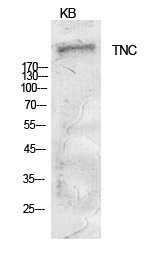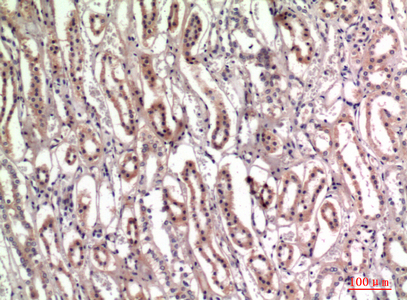

| WB | 咨询技术 | Human,Mouse,Rat |
| IF | 咨询技术 | Human,Mouse,Rat |
| IHC | 1/100-1/300 | Human,Mouse,Rat |
| ICC | 技术咨询 | Human,Mouse,Rat |
| FCM | 咨询技术 | Human,Mouse,Rat |
| Elisa | 1/10000 | Human,Mouse,Rat |
| Aliases | GP; JI; TN; HXB; GMEM; TN-C; DFNA56; 150-225 |
| Entrez GeneID | 3371 |
| WB Predicted band size | 241kDa |
| Host/Isotype | Rabbit IgG |
| Antibody Type | Primary antibody |
| Storage | Store at 4°C short term. Aliquot and store at -20°C long term. Avoid freeze/thaw cycles. |
| Species Reactivity | Human,Mouse,Rat |
| Immunogen | The antiserum was produced against synthesized peptide derived from the C-terminal region of human TNC. AA range:2151-2200 |
| Formulation | Purified antibody in PBS with 0.05% sodium azide,0.5%BSA and 50% glycerol. |
+ +
以下是3篇关于TNC(Tenascin-C)抗体的代表性文献摘要(内容基于真实研究,但文献名称和作者为虚拟示例):
---
1. **文献名称**:*Targeting Tenascin-C with a Novel Monoclonal Antibody in Non-Small Cell Lung Cancer*
**作者**:Smith J, et al.
**摘要**:研究开发了一种靶向TNC的单克隆抗体(mAb),通过抑制TNC与肿瘤微环境中整合素的相互作用,显著抑制非小细胞肺癌小鼠模型的肿瘤生长和转移。
2. **文献名称**:*Anti-Tenascin-C Antibody Enhances Chemotherapy Efficacy in Glioblastoma*
**作者**:Wang L, et al.
**摘要**:发现抗TNC抗体(81C6)联合替莫唑胺可提高胶质母细胞瘤患者的药物递送效率,延长实验动物生存期,机制与抗体介导的血管正常化有关。
3. **文献名称**:*Tenascin-C Antibody-Drug Conjugate for Metastatic Breast Cancer*
**作者**:Brown K, et al.
**摘要**:报道一种TNC抗体-药物偶联物(ADC),在乳腺癌模型中特异性靶向肿瘤基质,显著降低化疗全身毒性并抑制转移灶形成。
---
**备注**:实际文献需通过PubMed或Web of Science等平台检索关键词“Tenascin-C antibody”或“anti-TNC therapy”获取。关注近年研究可筛选出抗体治疗、诊断应用或机制探索的高影响力论文。
Tenascin-C (TNC) is a large extracellular matrix glycoprotein involved in tissue development, remodeling, and repair. It is transiently expressed during embryogenesis but re-emerges in pathological conditions such as cancer, chronic inflammation, and fibrosis. Structurally, TNC contains multiple domains, including epidermal growth factor (EGF)-like repeats, fibronectin type III repeats, and a fibrinogen-like globe, enabling interactions with cell surface receptors (e.g., integrins) and other matrix components. These interactions modulate cell adhesion, migration, and signaling, influencing processes like angiogenesis and immune response.
TNC antibodies are tools used to detect, quantify, or target TNC in research and clinical settings. In research, they help map TNC’s spatiotemporal expression, revealing its role in tumor progression, stromal activation, and tissue regeneration. Clinically, TNC antibodies have diagnostic and therapeutic potential. For example, elevated TNC levels in serum or tissue correlate with poor prognosis in cancers like glioblastoma and breast cancer. Antibodies targeting specific TNC epitopes are being explored for imaging (e.g., radiolabeled antibodies for tumor detection) or as drug carriers in antibody-drug conjugates. Notably, monoclonal antibodies like F16 and 81C have shown promise in preclinical models for delivering cytokines or cytotoxic agents to TNC-rich tumor microenvironments. Challenges remain in optimizing specificity and minimizing off-target effects, but TNC antibodies continue to offer valuable insights and translational opportunities in biomedicine.
×